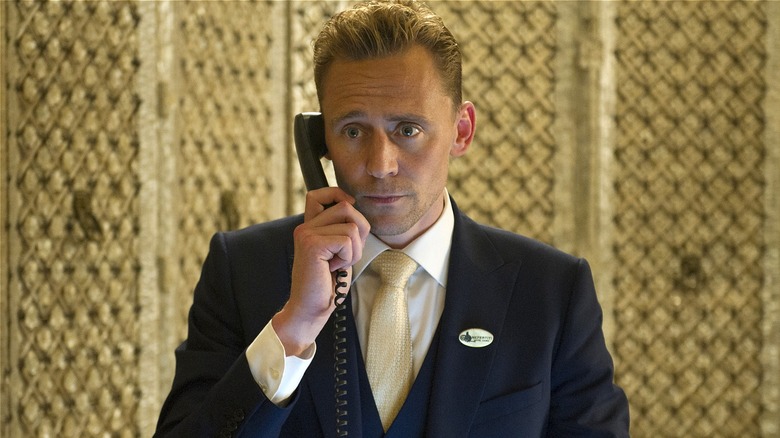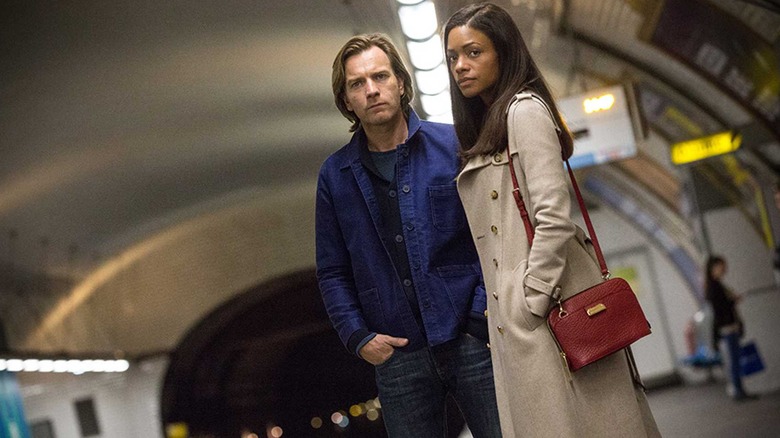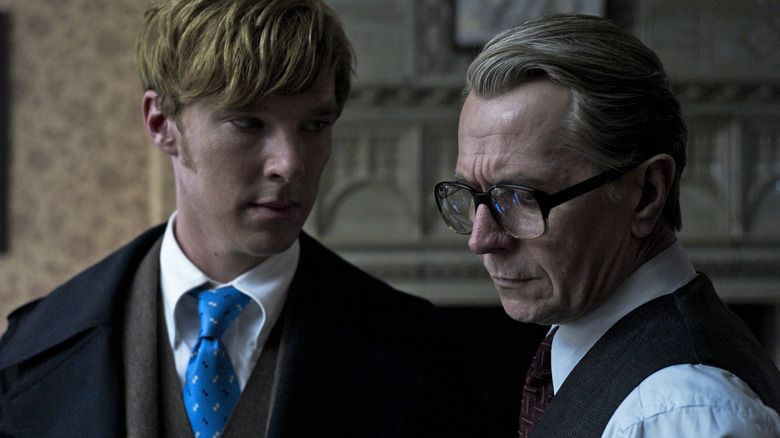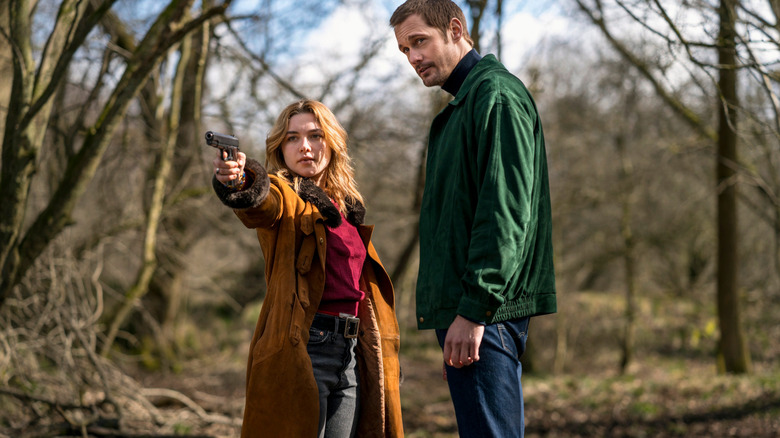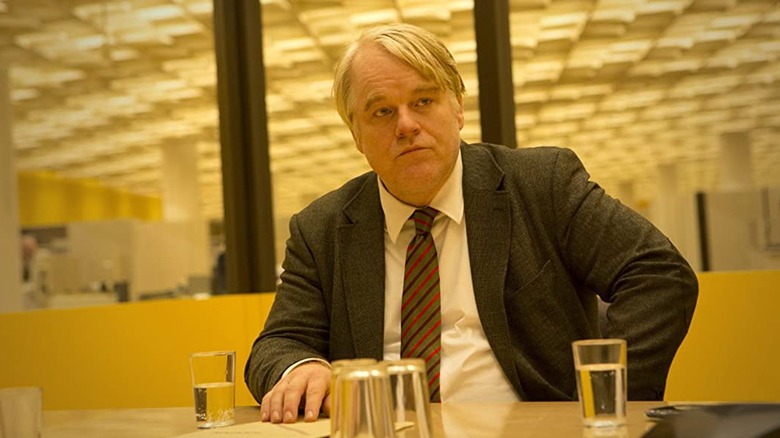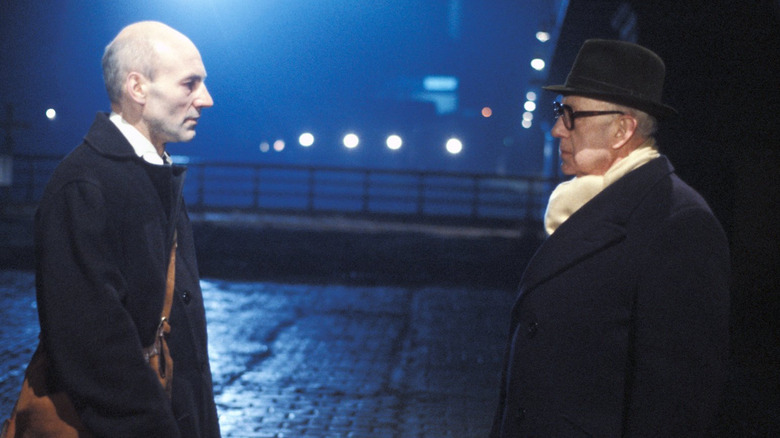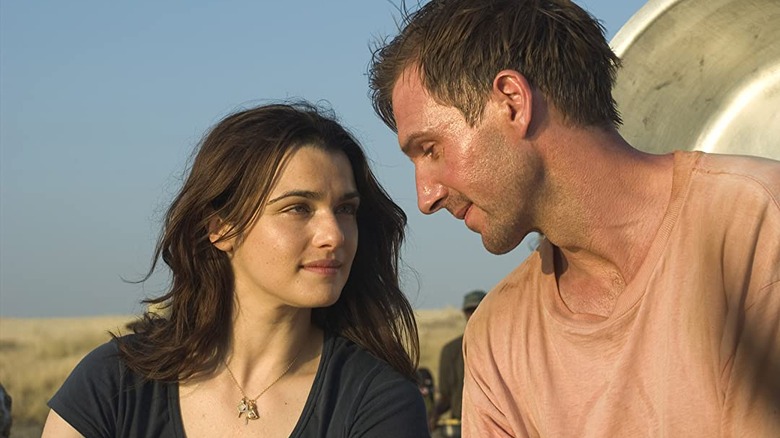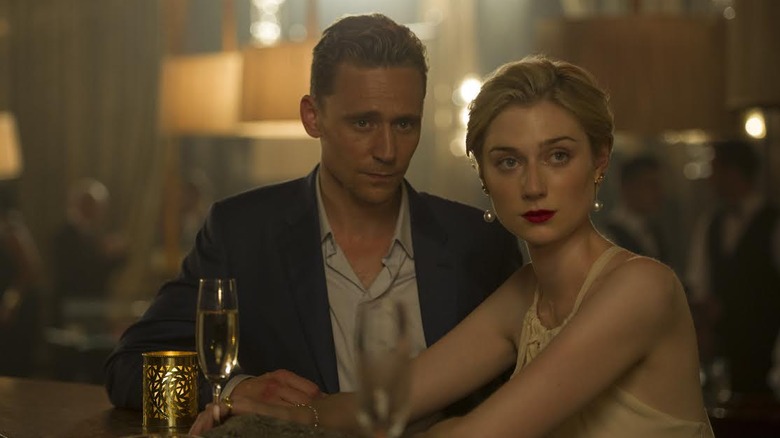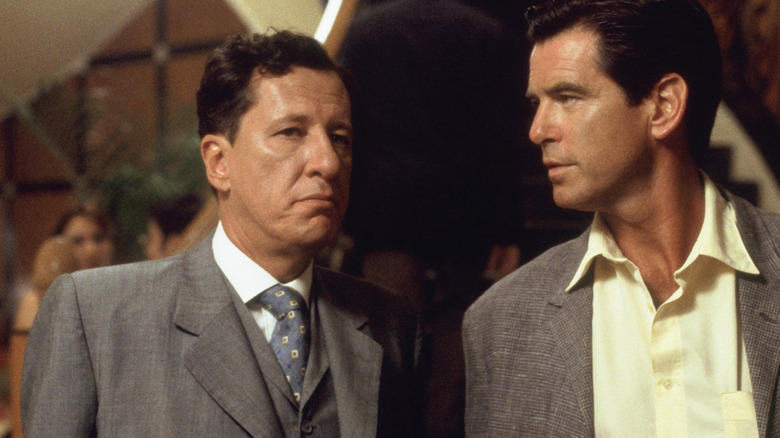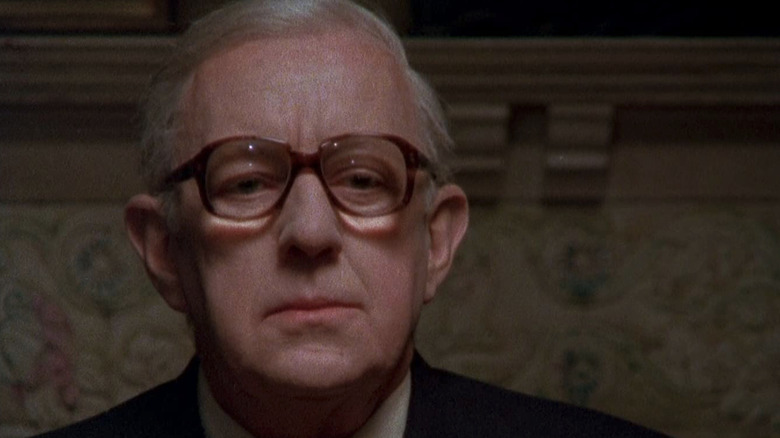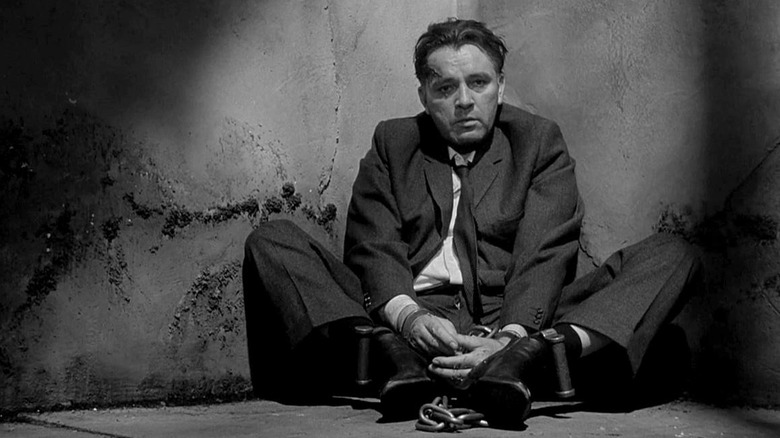Best John Le Carré Adaptations Ranked
Given how subtle and literary his many espionage novels are, it's a little amazing that the work of British author John le Carré has been adapted into movies and television so often. Le Carré heroes certainly aren't men of action — the protagonist of many of his novels, the doughy and mild-mannered George Smiley, is considered the anti-James Bond. And the conflict and dramas are just as often played out internally (inside agencies or individual human beings) as between people and nations. Given this complex, understated approach, the filmed adaptations are a mixed bag, as it's simply easier to film action and combat than the surreptitious endeavors of spies.
But the good adaptations are very good, classics that illuminate the moral complexities and contradictions of governments as exemplified through the follies and hypocrisies of their intelligence agencies. Proof of le Carré's resonance is that his work keeps finding new generations of audiences, with high profile miniseries such as The Night Manager and The Little Drummer Girl being made just in the last few years. Of course, le Carré himself was constantly reimagining his work for contemporary relevance, long after the Cold War ended. And his moral fire never burned out. He continued to write relevant social critiques until the end of his life. Below we rank the best of their adaptations.
Our Kind of Traitor
Among the least successful of the le Carré adaptation renaissance of the 2010s (only $3 million at the U.S. box office), Our Kind of Traitor is still watchable given its slick production and stars. Ewan McGregor, Naomie Harris, and Damian Lewis all bring spy cred to the picture (with Lewis and McGregor having been linked to playing James Bond in their careers, and Harris part of the actual Bond franchise). The thriller takes on one of le Carré's favorite subjects: the corruption of the West, in this case London bankers and businessmen, in league with the Russian mob, who play a part in the global financial crisis of 2008. McGregor plays one of le Carré's decent Englishman who gets in way over his head. He's a professor tasked by the top Russian money launderer (a bearish Stellan Skarsgård) to turn over a list of corrupt London businessmen to MI6.
Of course everything goes wrong, with the standard double crosses, people who aren't who they say they are, etc. There is just enough action sprinkled throughout the exotic shooting locations — Finland, Bern, Paris, the French Alps, Marrakech — to keep things tense. Our Kind of Traitor isn't the most labyrinthine or demanding le Carré adaptation, but it's solid entry level le Carré for those working their way up to Tinker, Tailor, Soldier, Spy or A Most Wanted Man. And it gives a taste of the moral outrage coursing through le Carré's work.
Tinker, Tailor, Soldier, Spy (2011)
One of the most prominent recent adaptations of le Carré, which kicked off the author's renaissance of the 2010s, was this remake of one of his most popular and well-regarded novels. The film's pedigree is impeccable. The cast alone — Gary Oldman, Colin Firth, Mark Strong, Benedict Cumberbatch, John Hurt, Toby Jones, Ciarán Hinds, and Tom Hardy, among others — rivals any British film this century for pure prowess. And the production is note-perfect. One admirer wrote, "You can almost smell the stale cigarette smoke and flop sweat, feel the scratchy suit fabric and stained shag carpeting." Reviewers were more or less impressed. The Motion Picture Academy took notice as well, nominating the film for three Oscars, including Oldman's long overdue Best Actor nomination.
The story follows an aging George Smiley (Oldman) as he is called out of retirement to ferret out a mole at the top levels of "The Circus" (le Carré's famous term for MI6). As Smiley, Oldman is as enigmatic, reserved, and quietly dogged as Alec Guinness in the original 1979 miniseries (and its sequel, Smiley's People). But a two hour running time just doesn't cut it for the novel's labyrinthine plot, and even its fans admit the film can be hard to follow. The Spectator summed it up: "[It's] so beautifully executed and so visually absorbing and so atmospherically hypnotic that I wonder this: would it have been awfully greedy to have hoped to have wholly understood it, too?"
The Little Drummer Girl
AMC aired The Little Drummer Girl on the heels of the network's Emmy-nominated success with le Carré's The Night Manager. Despite a fiery performance by Florence Pugh in the title role, it wasn't quite as lauded as its predecessor — although it is better regarded than the 1984 version of the novel with Diane Keaton, which bombed. Both versions are based on le Carré's novel about an actress, Charlie, who is recruited by the Mossad to infiltrate a Palestinian group plotting terrorism. Pugh plays the left-wing Charlie and she's the perfect choice to portray the character's youthful idealism. She's susceptible to the charms of the handsome Mossad agent, Gadi (Alexander Skarsgård), who recruits her, as well as the manipulations of Israeli spymaster Martin Kurtz (Michael Shannon). Kurtz believes Charlie has the chops as a performer to pull off the sustained lying required of great undercover spies.
Like all of le Carré's work, The Little Drummer Girl is densely plotted and requires close attention. TV critic Matt Zoller Seitz called the series, "dazzling but bloodless...more interesting to think about than to watch." Still, for those who occasionally like some thinking with their entertainment, there is plenty to enjoy here. Like Spielberg's Munich, which covers some of the same territory, the series explores the moral gray areas in the conflict between Israel and Palestine — the idea that for both sides, "there is no peace at the end of this."
A Most Wanted Man
After the Cold War, le Carré regularly turned his probing conscience to contemporary issues. In A Most Wanted Man, his subject is the moral ambiguity surrounding the War on Terror. Often his withering eye fell on the follies of the West, and perhaps never more harshly than after 9/11. In this film, the late Philip Seymour Hoffman plays Günther Bachmann, a German version of George Smiley. Gunter runs a network based in Hamburg, a major port city where the 9/11 plotters had a base. He wants to protect society from extremists — just not at any moral cost, like the German and American governments.
Directed by Anton Corbijn, the film is a few thrills short of a solid thriller, but as a handsomely mounted and thoughtful drama, it's satisfying. The cast is loaded with famous American actors — Willem Dafoe, Rachel McAdams, Robin Wright — doing European accents with varying levels of success. But the main reason to see it, aside from le Carré's indictment of Western governments, is for Hoffman's final lead performance. The actor perfectly conveys the sort of knowing, bemused irony that Günther feels as he regards those who will do anything to vilify their enemy while justifying themselves. As usual, Hoffman immerses himself in the role, though it's hard not to also see some real life parallels between Hoffman and Günther, a shambles of a man who seems resigned to the fact that he's going to die early.
Smiley's People
Sir Alec Guinness had a career renaissance of sorts in the late 1970s and early 1980s He had already been a star for decades, winning an Oscar for The Bridge on The River Kwai, a star on the Hollywood Walk of Fame, and a British knighthood. But the late '70s brought him another period of international success with the Star Wars trilogy, in which he played Obi-Wan Kenobi, and two BBC miniseries of le Carré's best selling George Smiley novels, Tinker, Tailor, Soldier, Spy (1979), and its follow-up.
Not quite as acclaimed as Tinker, Tailor... and its ingenious central mystery, Smiley's People nonetheless struck a nerve during one of the Cold War's chilliest periods, when the threat of the Communist bloc and thermonuclear war was predominant in the popular imagination. It was a comforting idea that the hard-won intelligence of spies who were doing work on the other side of the Iron Curtain — while also ferreting out moles at home in our own intelligence agencies — would keep the West safe. In Smiley's People, Smiley works to take down his Soviet spymaster nemesis Karla (played by a pre-stardom Patrick Stewart) once and for all. Though critics weren't quite as enthralled with the storytelling of Smiley's People, the consensus was that Guinness once again masterfully embodied the titular character in all his enigmatic contradictions. David Denby wrote that the performance was one of the "great literary-cinematic creations of the post-war era, an actor's masterpiece."
The Constant Gardener
Director Fernando Meirelles, who gave such an indelible sense of place to his home country of Brazil in his instant classic City of God, does the same in this movie with Nairobi, Kenya. He provides eye-opening views of the overpopulated neighborhoods, unpaved roads, and rows of shacks with their corrugated tin roofs spilling endlessly to the horizon. The movie's style feels a bit dated — the Bourne-style shaky cam and the grainy look instantly places The Constant Gardener at the turn of the century, as do the fashions (sorry, but Ralph Fiennes will never look good in an oversized T-shirt and cargo shorts). While the aesthetic may seem musty, the subject of the movie feels as urgent as ever. Le Carré, searching for global villains in the wake of the Cold War, here settles on the international pharmaceutical giants, who have proven time and time again that they have few values beyond a healthy bottom line.
Fiennes plays Justin Quayle, a British diplomat who becomes embroiled in the Big Pharma cover-up that gets his wife Tessa (Rachel Weisz) murdered. Yes, the movie is yet another story that uses poor indigenous people as a backdrop in their own home while foregrounding white saviors. But The Constant Gardener still has a lot going for it, including fleet pacing and some of the best performances of any le Carre adaptation, from Fiennes, Danny Huston, Bill Nighy, and especially Weisz, who won an Oscar for her role in the film.
The Night Manager
Tom Hiddleston looks as good in a suit in this show as anybody alive. Watching him play a spy in this miniseries (although of the reluctant le Carré sort, naturally) is among the many convincing arguments that he should be the next James Bond. The actor plays Jonathan Pine, a hotel manager and former British soldier, who is recruited to infiltrate the inner circle of international arms dealer Richard Roper, played with convincing menace by Hugh Laurie. Hiddleston and Laurie crackle together on the screen, as do Hiddleston and Elizabeth Debicki, who plays Roper's American girlfriend, and who eventually falls for Hiddleston. (I mean, who wouldn't? Those suits!) Rounding out the stellar cast are Tom Hollander and Oscar winner Olivia Colman, who plays Pine's London handler.
The 1993 novel was set in the aftermath of the Cold War when the world's less rigid boundaries began to open up markets for arms dealers, but it's been shrewdly updated for 2016, with the weapons intended for strongmen in the Middle East. This is among the most successful le Carré adaptations, and one of the most glamorous. For those who find the pleasures of A Most Wanted Man too cerebral, they can revel in this full-blooded series, gorgeously filmed in a number of glitzy locations including Switzerland, Morocco, and Spain. Danish director Susanne Bier keeps the six-part show moving, and while explosions and gunfire may not be quintessential le Carre, the series climaxes with a satisfying action movie bang.
The Tailor of Panama
Pierce Brosnan could have leaned on his James Bond cred to take paycheck roles in action thrillers. Instead he used his movie industry leverage to take provocative parts in dark material like The Matador and this savage adaptation of le Carré's novel. The movie signals immediately that it's the anti-Bond, opening with an exterior shot of MI6, which figured so prominently in the opening of The World is Not Enough. But instead of saving London, his character, the vulgar and crass Andrew Osnard, is packed off to Panama as punishment for some unspecified professional sins. Once there, Osnard recruits the British expat (and ex-con) Harry Pendel, the tailor of the title — played by Geoffrey Rush — to give him dirt on the local political resistance.
Brosnan and Rush play their parts with exquisite comic flair, bringing their characters just to the razor's edge of parody, without taking the movie into full-fledged farce. Harry is making up the information that he's giving Andy out of whole cloth (no pun intended), but Andy doesn't care. He just wants to please his bosses so that he can get out of Panama with a bag of ill-gotten cash. The idea that anybody would do anything for king or country in this ignoble place is laughable. "Welcome to Panama," Harry says to Andy, "Casablanca without heroes." Le Carré was often very earnest in his condemnation of spies and governments, but this Strangelovian black comedy is a welcome departure.
Tinker, Tailor, Soldier, Spy (1979)
Along with The Spy Who Came in from the Cold, and the uber-literary A Perfect Spy from 1986, Tinker, Tailor, Soldier, Spy is considered one of le Carré's best novels, with NPR going so far as to call it the "greatest spy story ever told." Though le Carré based the mole at the heart of the story on real life 1950s British spy Kim Philby, Tinker, Tailor... was also very much of its moment, capitalizing on the paranoia that American and British citizens felt about their governments in the 1970s in the wake of Watergate, CIA domestic wiretapping, and official lies about how the Vietnam War was being waged.
Tinker, Tailor was the first television adaptation of le Carré (the previous adaptations had been movies) and the more leisurely format of the mini-series was the right choice for the complex and expansive plot (as the commendable but muddled 2011 movie version with Gary Oldman proves). But despite the five-hour length, the pacing stays tight as Smiley, ever the patient hunter, encircles his prey. The evocative mood, the way that the twisty narrative is rendered with such elegant clarity, and the performances — especially by Guinness — make this miniseries the second most successful adaptation of John le Carré, and one well worth seeking out.
The Spy Who Came in from the Cold
Of all the adaptations of le Carré's work, Martin Ritt's black and white 1965 film probably comes closest to capturing the mood and the feel of le Carré — the pervasive melancholy and cynicism, undergirded by a stubborn romanticism and punctured by the occasional burst of passionate idealism. Nobody ever played this better than Sir Richard Burton, whose face even at its blankest suggests both struggle and hope. He plays the British spy Alec Leamas, who battles the bottle as he searches in vain for moral certainty in the deadly espionage games played between Great Britain and Communist East Germany. Burton himself was a famous alcoholic, and his character's struggle with booze in this film feels all too real.
As someone who had been blacklisted from Hollywood for his supposed Communist associations, Martin Ritt was the perfect director for this material. Not only did he have Marxist sympathies, but he knew exactly how to dramatize the hypocrisy of Western democracies that were just as willing as the Soviets to purge citizens if it kept society in line. Shot in rainy London and Berlin in gorgeous high contrast black and white cinematography, The Spy Who Came in from the Cold remains the epitome of filmed le Carré. Its famously bleak ending poses the central question that underscores all of le Carré's work, here posed by Leamas: "How big does a cause have to be before you kill your friends?"
